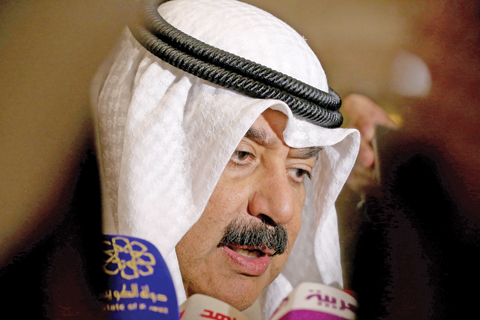 KUWAIT: Kuwait’s Deputy Foreign Minister Khaled Al-Jarallah speaks to reporters after a meeting of the Counter-IS Finance Group (CIFG) yesterday. — Photo by Yasser Al-Zayyat
KUWAIT: Kuwait’s Deputy Foreign Minister Khaled Al-Jarallah speaks to reporters after a meeting of the Counter-IS Finance Group (CIFG) yesterday. — Photo by Yasser Al-ZayyatKUWAIT: The State of Kuwait is ready to continue efforts to achieve an agreement among the Yemeni parties, to put an end to the conflict in the country, said Kuwait's Deputy Foreign Minister Khaled Al-Jarallah yesterday.
This came in Al-Jarallah's reply to a reporter's question on Kuwait's vision towards the current situation in Yemen, as he emerged from the opening session of a meeting held by a panel on preventing the funding of the so-called Islamic State (IS) -- under umbrella of the Global Coalition Against the IS.
UN Special Envoy for Yemen Ismail Ould Cheikh Ahmad is exerting efforts to end the crisis and he is optimistic over a possibility of reaching a solution to the conflict in Yemen, Jarallah said. The senior official affirmed that the region's countries are also lavishing efforts to halt the bloody conflict.
Al-Jarallah denied that there are mediation efforts by Kuwait amongst Yemeni parties, emphasizing his country's readiness to back all efforts to end the war there. Kuwait hosted the UN-brokered peace talks amongst Yemeni parties on April 21- August 6, as part of the international endeavors to end the Yemeni crisis.
Lebanon
Meanwhile, Jarallah quashed Lebanese media reports that Kuwait is leading a campaign against a certain presidential candidate in Lebanon. "Kuwait stands at equal distance from all Lebanese parties," he stressed. Referring to the reports as 'utterly groundless,' he categorically denied that Kuwait has, or intends to, interfere in Lebanon's internal affairs or support party against another.
This stance is integral to Kuwait's foreign policy, established by His Highness the Amir Sheikh Sabah Al-Ahmad Al- Jaber Al-Sabah, namely no-interference in the internal affairs of other countries, with keenness on "gaining friends." This is an approach that will never be abandoned, Jarallah stressed.
Egypt
In the meantime, Jarallah affirmed that the bonds between the GCC countries and the Arab Republic of Egypt have been solid, noting that support for the nation particularly at the economic level would continue, and adding that the GCC states' relations with Egypt have been strong and solid. On record fall of the Egyptian pound value, Jarallah said the Egyptian currency rating "is determined by the market and Egypt's economic conditions." He affirmed that Kuwait, along with the other GCC member states, would continue backing Egypt's economy, its security and stability. He denied reports about a 'crisis' in Egypt's ties with the GCC countries indicating that such allegations are merely ink on paper.
Iraq
In further statements to journalists after the inauguration session, Jarallah affirmed that Kuwait is fully prepared to cope with any eventualities emanating from the battle for control of the northern Iraqi city of Mosul.
Asked whether there are any concerns that the IS militants might move to southern Iraq and to locations close to the borders with Kuwait, Jarallah said: "we ought to expect anything from this terrorist organization." He reiterated full support for the Iraqi Government in its battle to retake Mosul and congratulated the Iraqis on their victories on the field.
Jarallah indicated that Kuwait was maintaining its armament policy, securing weapons from strategic allies, namely the United States of America. First Deputy Prime and Foreign Minister Sheikh Sabah Khaled Al-Hamad Al-Sabah has said that Kuwait's military procurements from the US exceeded $25 billion and has affirmed that the sides have been negotiating on further deals, worth $11 billion. Jarallah noted that Kuwait had enacted laws intended to dry up financial resources of the terrorist organizations and has made headways in monitoring charitable donations. - KUNA










